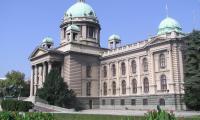Serbia
Republic in the Western Balkans, facing significant democratic challenges
Serbia is a parliamentary republic in the Western Balkans, with a resident in charge who can serve a maximum of two terms. However, the country's democracy has been severely challenged for a long period of time.
Serbia has had a turbulent recent history since the collapse of Yugoslavia in 1991. Ten years of intense wars between Yugoslavia's former republics have left brutal marks on the entire country. After the wars, Serbia briefly formed a union with Montenegro before choosing to secede after a 2006 referendum. Since 2008, Serbia has had a territorial conflict with the Republic of Kosovo, whose independence is recognised by 98 states.
Since the national conservative Serbian Progressive Party (SNS) came to power in 2012, the country has experienced significant democratic decline due to restrictions on both press freedom and individual freedoms. According to the V-dem Institute, Serbia is among the ten countries in the world that have experienced the greatest decline in the past decade and is now classified as an electoral autocracy. This was seen in the 2022 elections, where some irregularities favoured the incumbent President, Aleksandar Vučić, who won re-election.
Population: 6,899,126
Liberal Democracy Index: 0,27.*
[LDI captures both electoral and liberal aspects of democracy].
Proportions of seats held by women in Parliament: 34,8%**
Proportions of seats held by youth under 30 in Parliament: 44,8%**
*V-Dem Institute
**IPU.org

